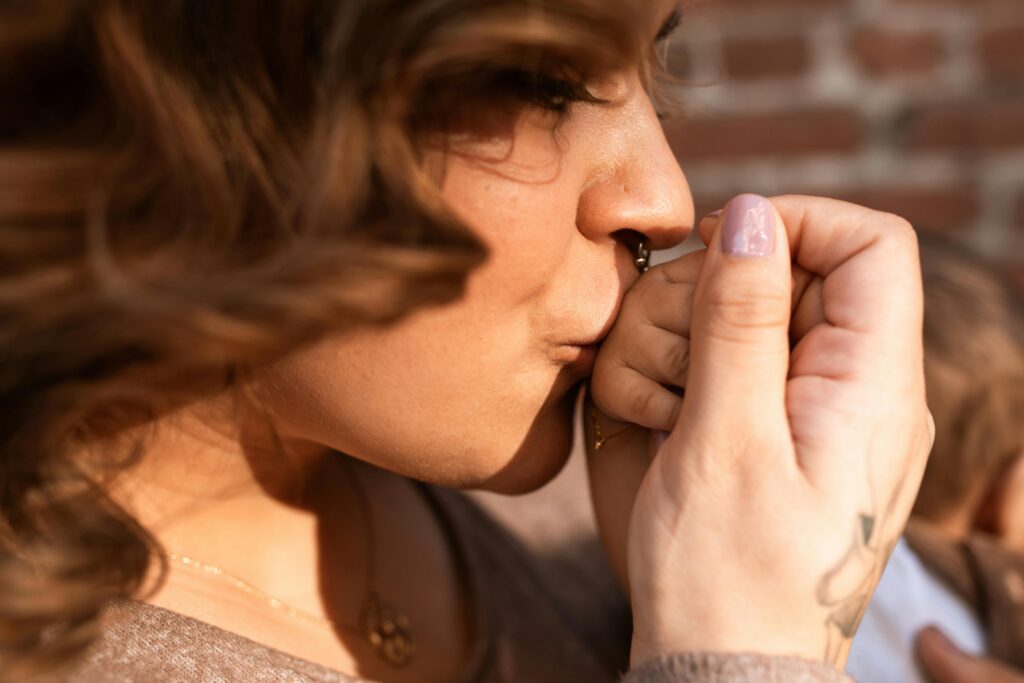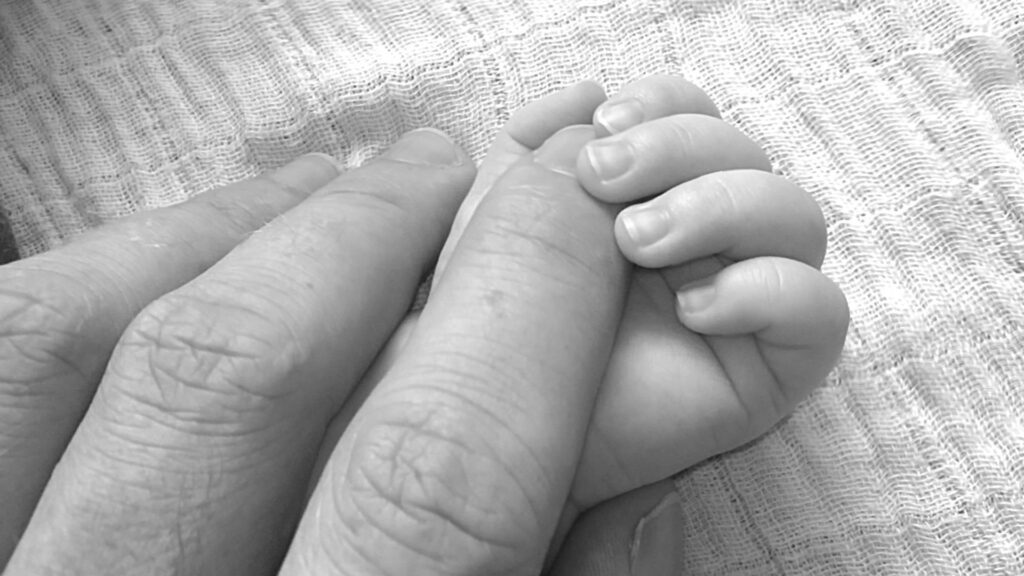Welcoming a newborn into the world is an exciting yet challenging time for mothers. With so much information available, new moms often have a whirlwind of questions. This blog aims to provide clear and concise answers to the common questions that mothers of newborns frequently search for in their newborn care. These special nurturing notes by Hustling Naari might help you go through this important yet overwhelming phase of life.
Table of Contents
Toggle1. How do I know if my baby is hungry?
Newborns typically show signs of hunger through rooting reflexes, turning their heads towards anything that touches their cheek and sucking movements. If your baby is smacking their lips, putting their hands to their mouth, or fussing, these can also be cues. Additionally, crying is a late sign of hunger, so it’s best to respond to the earlier cues to avoid excessive fussiness.
2. What are the signs of a healthy newborn?
A healthy newborn generally has a good feeding pattern, adequate weight gain, and is alert when awake. Other signs include:
- Regular wet and dirty diapers
- Clear skin (with no significant rashes or discoloration)
- Responsive behavior (like turning their head toward sounds)
If you’re concerned about your baby’s health, don’t hesitate to reach out to your pediatrician.

3. How often should I feed my newborn?
Newborns typically need to be fed every 2 to 3 hours, including during the night. If breastfeeding, it’s normal for babies to nurse for about 10 to 15 minutes on each side. Formula-fed babies may consume about 2 to 3 ounces per feeding initially, gradually increasing as they grow.
4. What should I do if my newborn won’t stop crying?
Crying is normal for newborns but can be distressing. If your baby is crying excessively:
- Check if they’re hungry or need a diaper change.
- Swaddle them snugly and gently rock them.
- Use white noise or soft lullabies to create a calming environment. If the crying persists and you’re concerned, consult your pediatrician.
5. How can I establish a sleep routine for my newborn?
Establishing a sleep routine is crucial for both you and your baby. Here are some tips:
- Create a consistent bedtime by putting your baby down at the same time each night.
- Implement a calming bedtime ritual such as reading or singing.
- Ensure the sleep environment is safe, quiet, and dark.
Remember, newborns sleep a lot but in short bursts, typically 16 to 17 hours a day.
6. What are the best ways to soothe a fussy baby?
To soothe a fussy baby, try:
- Swaddling to provide comfort.
- Gently rocking or bouncing them.
- Offering a pacifier or allowing them to suck on their thumb.
- Using skin-to-skin contact, which can be very calming.

7. How do I change a diaper properly?
Changing a diaper is straightforward:
- Lay your baby on a clean surface and remove the dirty diaper.
- Wipe from front to back, especially for girls, to prevent infections.
- Apply diaper cream if necessary.
- Place a clean diaper under your baby and fasten it snugly but not too tight.
8. What vaccinations does my newborn need?
Newborns typically receive their first vaccinations within the first few months of life. Important vaccines include:
- Hepatitis B (given shortly after birth)
- DTaP (Diphtheria, Tetanus, and Pertussis) at 2, 4, and 6 months
- Polio, MMR (Measles, Mumps, and Rubella), and others as per the immunization schedule.
Always consult your pediatrician for a personalized vaccination schedule.
9. How can I help my newborn with gas and colic?
To alleviate gas and colic:
- Burp your baby during and after feeds to release trapped air.
- Try bicycle legs—gently moving their legs in a cycling motion.
- Ensure a proper latch during breastfeeding to minimize air intake.
10. What’s the best way to bathe my newborn?
For the first few weeks, sponge baths are recommended until the umbilical cord stump falls off. Here’s how to do it:
- Gather all supplies: a soft washcloth, warm water, and a towel.
- Place your baby on a flat, safe surface, and use a damp washcloth to clean their face and body.
- Once the cord stump is gone, you can start giving them a tub bath.
11. How can I bond with my newborn?
Bonding can happen through:
- Skin-to-skin contact, which is essential in the early days.
- Talking, singing, and making eye contact.
- Engaging in baby massage to promote relaxation and connection.

12. When should I schedule my baby’s first doctor’s appointment?
The first doctor’s appointment typically occurs within the first week after birth. Regular check-ups will follow, often at 1 month, 2 months, and so on, to monitor growth and development.
13. What are the best clothing options for newborns?
Choose soft, breathable fabrics for your newborn’s clothing. Opt for:
- Onesies for easy dressing and diaper changes.
- Sleep sacks for safe sleep.
- Layering clothes to adjust to temperature changes.
14. How do I handle postpartum recovery while caring for my newborn?
Postpartum recovery can be challenging. Here are some tips:
- Prioritize self-care and rest when possible.
- Accept help from family and friends.
- Stay hydrated and maintain a balanced diet to support recovery.
15. What are some tips for breastfeeding successfully?
To promote successful breastfeeding:
- Ensure a proper latch; your lactation consultant can help with this.
- Feed your baby on demand, which helps establish a good milk supply.
- Don’t hesitate to ask for help or join breastfeeding support groups.
16. How do I know if my baby is getting enough breast milk/formula?
Signs that your baby is getting enough include:
- Regular weight gain.
- At least 6 wet diapers and 3-4 dirty diapers daily.
- Contentment after feeding.
17. When should I start tummy time with my newborn?
You can start tummy time as early as 2 weeks old. Aim for a few minutes each day, gradually increasing the time as your baby grows. This helps develop neck and shoulder muscles.

18. What are the signs of jaundice in newborns?
Signs of jaundice include:
- A yellow tint to the skin and eyes.
- Poor feeding or lethargy. If you notice these signs, consult your pediatrician promptly.
19. How can I tell if my baby has a fever?
A fever in newborns is often defined as a rectal temperature of 100.4°F (38°C) or higher. If your baby feels warm to the touch, is unusually irritable, or has difficulty feeding, check their temperature. Always consult a doctor if you suspect a fever.
20. What should I do if my newborn has a rash?
Most rashes in newborns are harmless. However, if your baby develops a rash:
- Keep the area clean and dry.
- Avoid using any new products until the rash resolves.
- Consult your pediatrician if the rash persists or if you notice signs of infection.
Conclusion

Going through the newborn phase can be both joyous and challenging. By addressing these common questions and concerns, mothers can feel more confident in caring for their little ones. Every baby is unique, so trust your instincts, and don’t hesitate to reach out to healthcare professionals when you have questions. Hustling Naari is dedicated to helping women in any condition. Your journey into motherhood is just beginning, and with the right support and knowledge, you can embrace it fully!



8 thoughts on “Essential Guide For New Mothers to Newborn Care”
Thanks for sharing. I read many of your blog posts, cool, your blog is very good.
Your article helped me a lot, is there any more related content? Thanks! https://accounts.binance.com/vi/register?ref=WTOZ531Y
I am extremely inspired with your writing abilities as neatly as with the
layout in your blog. Is this a paid topic or did you customize it
your self? Either way stay up the nice high quality writing, it’s rare to see
a great blog like this one nowadays. HeyGen!
Can you be more specific about the content of your article? After reading it, I still have some doubts. Hope you can help me.
Your article helped me a lot, is there any more related content? Thanks!
Thanks for sharing. I read many of your blog posts, cool, your blog is very good.
Your article helped me a lot, is there any more related content? Thanks! https://www.binance.com/ru-UA/register?ref=OMM3XK51
Thank you, your article surprised me, there is such an excellent point of view. Thank you for sharing, I learned a lot.